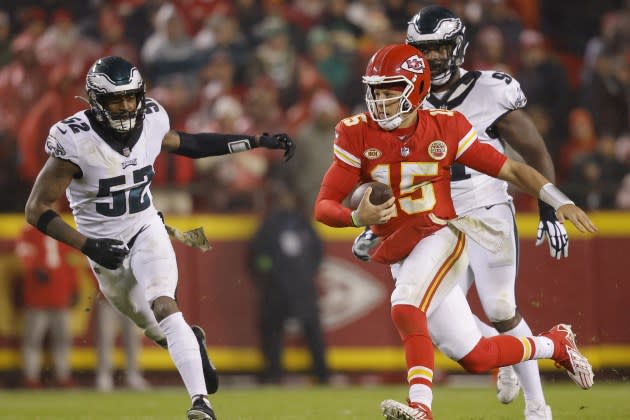Success of ESPN-Fox-Warner Sports Streaming Bundle Hinges on a Key Question: What Will It Cost?

Three big media players — Disney/ESPN, Fox Corp. and Warner Bros. Discovery — have huddled up to create what some are already calling “Hulu for Sports.”
The joint venture, currently pegged to launch in the fall of 2024, will include ESPN+, plus streaming feeds of 14 linear TV networks: ESPN, ESPN2, ESPNU, SECN, ACCN, ESPNews, ABC, Fox, FS1, FS2, Big Ten Network, TNT, TBS and truTV. You’ll be able to get it directly from the (as-yet unnamed) joint venture, as well as as an add-on via services like Disney+, Hulu and Max.
More from Variety
Warner, Fox, Disney to Launch Streaming Sports Joint Venture
Gina Carano Sues Disney Over Firing From 'The Mandalorian,' Elon Musk Funding the Suit
One of the critical questions that will determine if the JV moves the needle is currently unanswered: What will it cost? The monthly pricing will need to be attractive enough to lure cord-nevers and cord-cutters — who have shunned traditional cable and satellite TV — while also ensuring Disney, Fox and WBD avoid cannibalizing their own streaming services and linear networks.
The signals are that it’s going to be priced well over general entertainment streamers like Netflix or Max, which are under $20/month, but less than internet pay-TV packages like Hulu + Live TV or YouTube TV (which cost around $75 to $80/month).
Ex-Fox Sports Networks president Bob Thompson told USA Today he expects it to cost more than $40 per month. Analysts at LightShed Partners predict the bundle will carry a $35/month initial price point, going up to $40 in year two. Under a prorated revenue-sharing scheme, Disney would receive about $20 per sub per month of the initial total fees, while Fox would get $8 and Turner would receive $4, the analysts wrote.
But if you add up the distribution fees for ABC, Fox, ESPN and the other cable networks, it suggests the bundle will have to carry a retail price of at least $50 per month, according to Morgan Stanley’s Ben Swinburne.
For now, it’s not clear whether the price the trio of media companies land on for the bundle will be a price consumers are willing to pay, said Paul Verna, VP of content at Insider Intelligence (formerly eMarketer).
“So far, media conglomerates have had a rough time making the streaming model work, especially for the exorbitantly priced sports properties Disney, Fox and WBD plan to carry,” Verna said. “Joining forces might give them scale, but it won’t solve the riddle of how to monetize this content.”
On the other hand, Verna added, “If it succeeds, the sports streaming service announced by Disney, Fox and Warner Bros. Discovery will knock competitors off balance, deal a body blow to the teetering cable ecosystem, and generate lucrative revenue streams for the three partners.”
Part of the equation in estimating consumer interest is that the ESPN-Fox-WBD sports bundle will have some significant gaps in coverage — namely, the sports rights owned by Paramount Global/CBS (NFL, NCAA March Madness, UEFA) and Comcast/NBCUniversal (Olympics, NFL “Sunday Night Football,” Premier League, college football, PGA). Paramount and NBCU were not invited to be part of the Disney/Fox/Warner joint venture because that would have made the consortium unmanageable — and would push the price of a subscription higher than consumers would be willing to go for, a source told Variety.
Assuming the retail price of the ESPN-Fox-WBD bundle is in the $40-$50/month range, a sports fan could recreate the traditional pay-TV bundle for roughly $60 with the addition of Paramount+ and NBCU’s Peacock, according to UBS analyst John Hodulik. A risk, he wrote in a Feb. 7 note, is that “A steeper discount could accelerate cord-cutting (or in this case, ‘cord shaving’) and further devalue entertainment-based long-tail networks,” he noted.
Some consumers may be interested in cobbling together an ad-hoc cable bundle that comprises the ESPN-Fox-WBD service with Peacock and Paramount+ to get a more complete sports lineup for less than traditional pay TV, the LightShed team noted. However, “having the content spread across multiple services seems far from compelling from a consumer experience standpoint,” the analysts wrote, asking rhetorically, “Is it worth [for consumers] to simply pay more and have everything in one place with one interface?”
Meanwhile, the joint venture faces other obstacles, including necessitating each of the CEOs — Disney’s Bob Iger, Fox Corp.’s Lachlan Murdoch and Warner Bros. Discovery’s David Zaslav — to cooperate and run from the same playbook. As Verna noted, that’s “no small feat when billions of dollars and outsized egos are at stake.”
Murdoch, on Fox’s earnings call Wednesday, downplayed the prospect that the streaming sports bundle would accelerate cord-cutting. “We would not be launching this product if we thought it was going to significantly affect” our pay-TV business, Murdoch said. According to Murdoch, the new sports joint venture could as many as 60 million “cord-nevers” in the U.S., positioning it as a way for the company to tap into a new segment.
The Disney, Fox and WBD sports-centered streaming bundle is a “defensive” move against Big Tech companies “angling to acquire future [sports] rights,” Wells Fargo analyst Steven Cahall wrote in a Feb. 6 note. While the three media companies will own both production and distribution, he added, the “financial value creation remains subject to many unknown variables” — including how the JV prices and packages the package, which is directly tied to expected subscriber uptake.
Pictured above: Kansas City Chiefs’ Patrick Mahomes scrambles with the ball against the Philadelphia Eagles during the Nov. 20, 2023, game, ESPN’s most-watched “Monday Night Football” telecast to date
Best of Variety
Sign up for Variety’s Newsletter. For the latest news, follow us on Facebook, Twitter, and Instagram.
